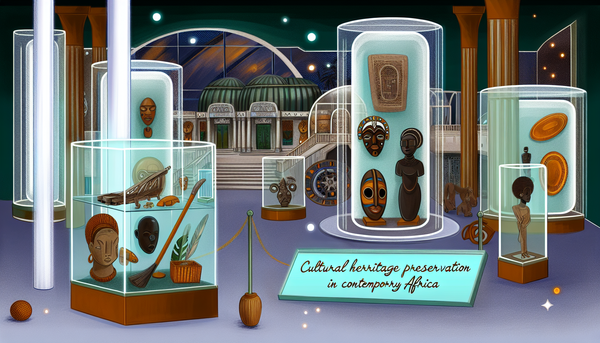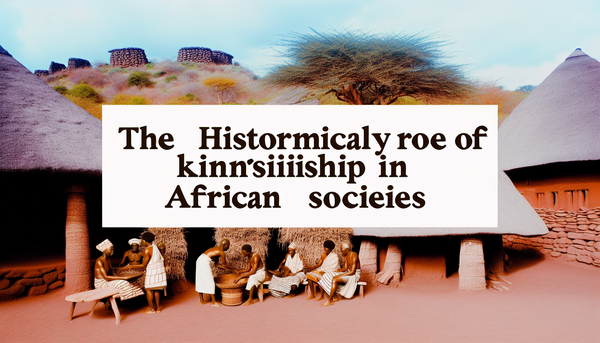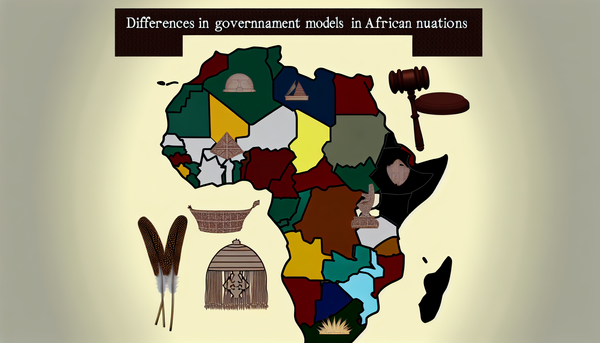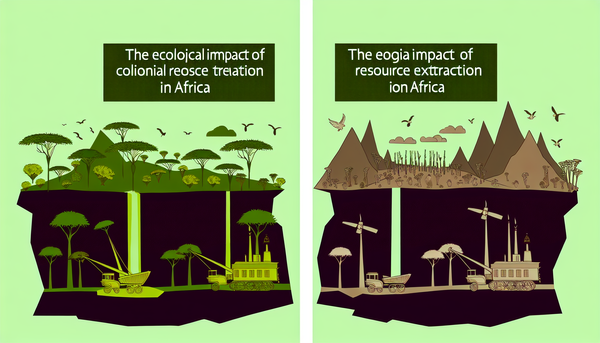The Role of International Relations in Africa's Historical Context

Colonial Legacy and Modern Diplomacy
The colonial period has profoundly shaped Africa's political landscape, influencing contemporary international relations on the continent. European powers carved up Africa in the late 19th and early 20th centuries, establishing artificial borders and governance structures that disregarded indigenous cultures and historical connections. This legacy of arbitrary demarcation has led to ongoing conflicts and tensions, as many ethnic groups find themselves split across national boundaries, complicating diplomatic relations.
In the post-colonial era, African nations have grappled with the challenge of redefining their identities on the global stage. The struggle for independence sparked a wave of nationalism, fostering a desire for self-determination and collaboration among countries. Modern diplomacy in Africa is, therefore, a balancing act between honoring historical ties and navigating the complexities of global politics.
Today, regional organizations, such as the African Union, work to address issues stemming from this colonial history by promoting peace, security, and economic cooperation. Additionally, emerging powers like China and India are reshaping foreign relations by offering alternative partnerships, thereby allowing African states to diversify their diplomatic engagements and assert their sovereignty in ways that respond to their unique historical contexts.
Pan-Africanism and Unity Initiatives
Pan-Africanism has been a transformative movement advocating for the solidarity of African nations and peoples, both on the continent and in the diaspora. Originating in the late 19th century, this ideology sought to counteract the divisive effects of colonialism and promote a shared sense of identity among Africans. Leaders like Kwame Nkrumah, Julius Nyerere, and W.E.B. Du Bois championed this vision, emphasizing the importance of political, economic, and cultural unity to combat exploitation and help uplift the continent.
In contemporary times, Pan-Africanism continues to resonate as a guiding principle for regional initiatives aimed at fostering cooperation and shared development goals. The African Union (AU), founded in 2001, embodies this spirit by promoting peace, stability, and integration among African states. Various initiatives, such as the African Continental Free Trade Area (AfCFTA), work to enhance economic collaboration and reduce dependency on external powers.
Furthermore, grassroots movements and organizations, such as the Pan-African Youth Union, mobilize younger generations to participate actively in the continent’s future. By instilling a sense of belonging and ownership, these unity initiatives not only honor the legacy of Pan-Africanism but also lay the groundwork for enhanced diplomatic engagement and collective action in addressing socio-economic challenges faced by African countries.
Geopolitical Alliances and Regional Stability
Geopolitical alliances play a pivotal role in shaping regional stability across Africa, as nations seek to navigate complex political landscapes influenced by internal challenges and global interests. The post-colonial era has seen the emergence of various organizations aimed at fostering unity and cooperation among African states, such as the African Union (AU) and regional bodies like ECOWAS, SADC, and IGAD. These alliances not only facilitate diplomatic dialogue but also promote collective security measures to address conflicts and crises.
One significant aspect of these collaborations is the focus on conflict resolution and peacekeeping. The AU’s Peace and Security Council is actively engaged in mediation efforts in war-torn regions, highlighting the continent’s commitment to self-determination and stability. Additionally, partnerships with external powers, such as the United States, China, and the European Union, have introduced new dynamics, offering resources and expertise while also presenting challenges of neocolonial influence.
Moreover, the increasing significance of economic alliances, such as the African Continental Free Trade Area (AfCFTA), enhances regional integration and interdependence, contributing to political stability. By fostering collaborations that prioritize common interests and sustainability, geopolitical alliances can effectively mitigate conflicts and promote a more stable and prosperous Africa.
Economic Partnerships and Development Impact
Economic partnerships have become crucial for Africa’s development, as the continent seeks to enhance its global standing while addressing pressing socio-economic challenges. Collaborative efforts with various global actors, including China, the European Union, and the United States, have brought investment, technology transfer, and knowledge sharing, significantly impacting economic growth and infrastructure development.
China's Belt and Road Initiative, for instance, has led to significant investments in African infrastructure projects, ranging from roads to energy facilities. These developments are essential for fostering trade and improving connectivity within and between nations. Additionally, partnerships with international organizations, such as the World Bank and the International Monetary Fund, have provided financial support and technical assistance for critical development programs.
Regionally, initiatives like the African Continental Free Trade Area (AfCFTA) aim to boost intra-African trade, reduce reliance on imports, and create job opportunities. By promoting free trade and economic integration, African countries can enhance their competitiveness and foster sustainable development.
However, these economic partnerships also bring challenges, including the risk of debt dependency and the potential for exploitative practices. To ensure that these collaborations lead to equitable growth, it is imperative for African nations to negotiate terms that prioritize their development needs and protect their sovereignty.
Migration and Cross-border Dynamics
Migration in Africa is a complex phenomenon driven by a myriad of factors, including economic opportunities, political instability, and environmental changes. The continent has a long history of intra-regional migration as individuals and families move across borders in search of better livelihoods and security. This movement often results in rich cultural exchanges and the development of diverse communities but also presents significant challenges regarding political relations and social integration.
Cross-border dynamics significantly influence international relations in Africa, as nations must navigate the implications of large migrant populations. Issues such as border security, human trafficking, and refugees fleeing conflict add layers of complexity to diplomatic engagements. Regional organizations, like the Economic Community of West African States (ECOWAS), have implemented protocols to facilitate the free movement of people and goods, aiming to foster economic integration and stability.
However, rising xenophobia and nationalistic sentiments have triggered stricter immigration policies in some countries, leading to tensions among neighbors. Sustainable solutions for migration management are essential, requiring collaborative approaches that address root causes, protect migrants' rights, and enhance regional solidarity. By embracing migration as a dynamic aspect of African development, nations can leverage cross-border movements to promote growth, unity, and resilience amid evolving global challenges.
Cultural Export and Soft Power Influence
Cultural export has emerged as a significant tool for African nations to assert their identity on the global stage and enhance their soft power. By sharing unique cultural elements—such as music, art, literature, and film—African countries can foster international goodwill and build influential relationships. The global popularity of Afrobeat, Nollywood films, and traditional African art has not only put African culture in the spotlight but also generated substantial economic benefits through creative industries.
Countries like Nigeria and South Africa have effectively utilized their cultural exports to enhance diplomatic relations and boost tourism. Platforms such as the African Film Festivals and the widespread presence of African music on global charts showcase the continent's rich cultural heritage and creativity. These cultural narratives challenge stereotypes and promote a more nuanced understanding of African societies.
Moreover, initiatives like the African Union's Agenda 2063 emphasize the importance of cultural diplomacy in fostering unity and promoting African solidarity. By investing in cultural exchange programs and collaborating with international partners, African nations can strengthen their soft power influence. This cultural engagement not only enhances national pride but also serves as a bridge to foster dialogue, understanding, and partnership with other nations, ultimately contributing to a more interconnected world.
Environmental Cooperation and Shared Resources
Environmental cooperation in Africa is crucial as nations confront the shared challenges posed by climate change, resource depletion, and biodiversity loss. Given the continent's diverse ecosystems and abundant natural resources, collaborative efforts are essential for sustainable management and protection. Overlapping environmental issues often transcend national borders, necessitating cooperative frameworks for effective responses.
Regional initiatives such as the African Union's Agenda 2063 underscore the importance of natural resource management and environmental sustainability. Mechanisms like the Nile Basin Initiative and the Congo Basin Forest Partnership exemplify how countries can work together to address threats to water security, deforestation, and wildlife conservation. Such partnerships allow nations to share knowledge, best practices, and technological innovations to combat environmental degradation.
Additionally, transboundary resource management emphasizes the need for equitable sharing of water, minerals, and energy resources. These collaborative efforts ensure that all parties benefit while promoting peace and reducing potential conflicts over scarce resources. Through shared commitments and joint projects, African nations can foster a resilient approach to environmental challenges. By prioritizing environmental cooperation and sustainable resource management, countries can safeguard ecosystems while enhancing regional stability and advancing socio-economic development for future generations.



